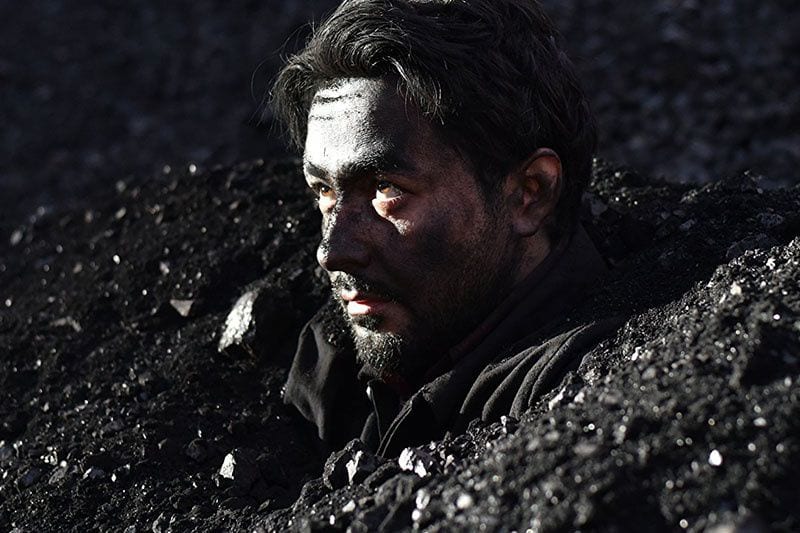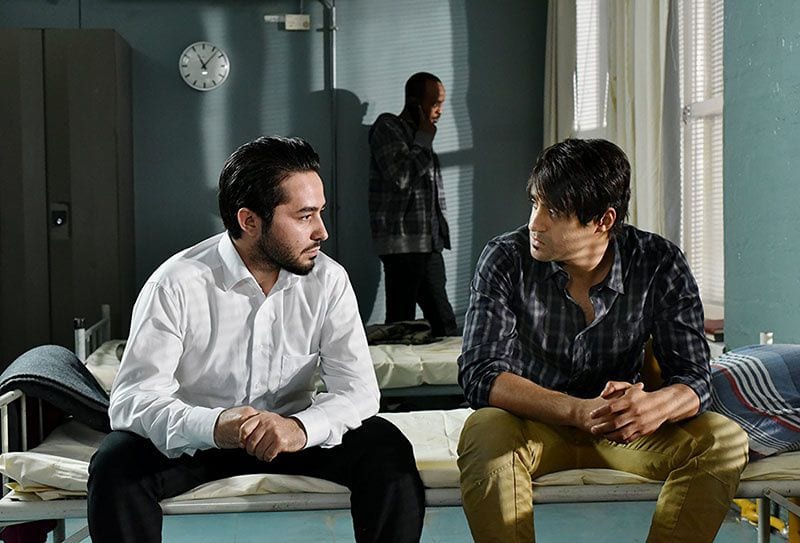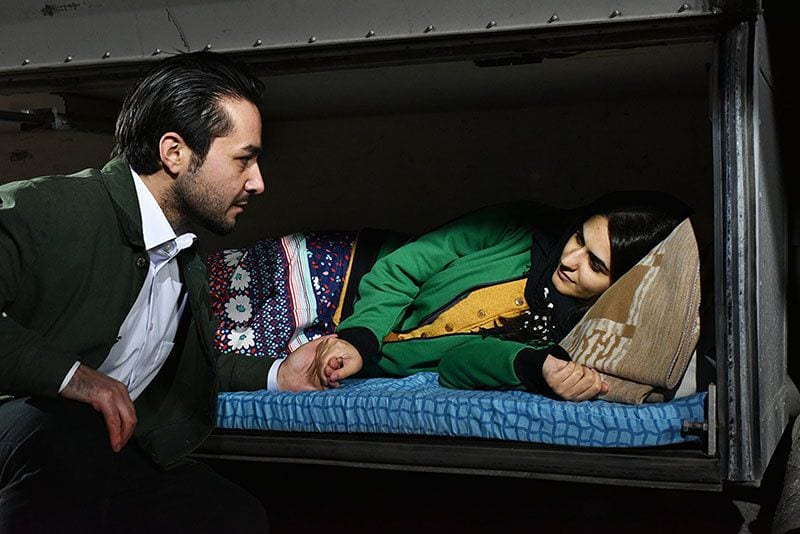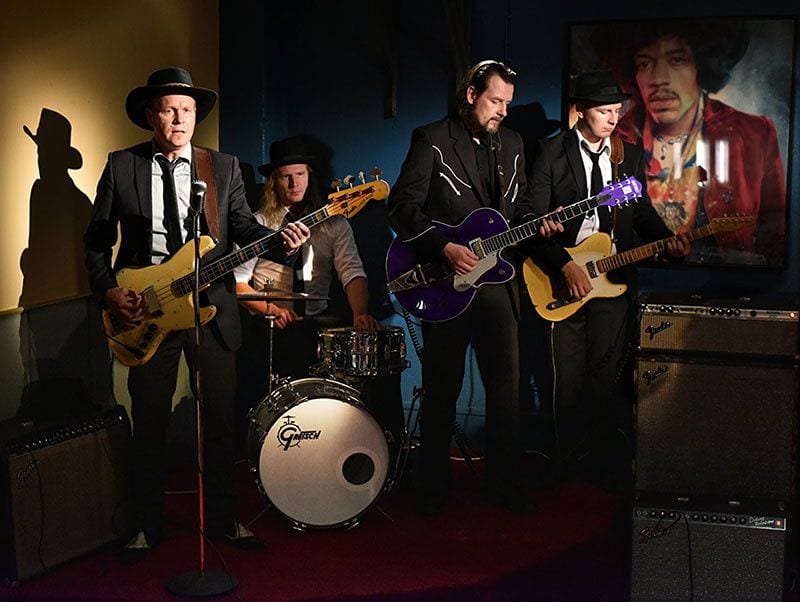
Of all today’s filmmakers who are commonly regarded as serious artists, Finland’s Aki Kaurismäki is the only one committed to happy endings, the only one consistently devoted to comedy, the only optimist. Kaurismäki’s optimism is as bruised as it is beautiful, as his characters of minimalist emotional presence get knocked about the landscape like pinballs perpetually on the verge of sinking into one hole or another. It’s a cold country, and these are lives on thin ice. The Other Side of Hope (Toivon tuolla puolen) follows two such human pinballs on their independent trajectories as they accidentally cross paths.
The film begins with a moment of eerie, dirty beauty. A face emerges from a load of coal on a ship. As the coal glitters with diamond-like flecks, the face seems to construct itself from the rock like a creature from a ’50s-era monster movie, or like Martin Sheen’s face emerging from the water in the iconic shot from Francis Ford Coppola’s Apocalypse Now (1979). Perhaps this man is a phoenix reborn from ashes.
This initially fantastical creature will soon be identified as Khaled (Sherwan Haji), a Syrian refugee who tells the capsule description of his odyssey in restrained closeup to a tall blonde female bureacrat. Like most of the Finns in this movie and all of Kaurismäki’s movies, she’s reserved in a manner slightly off-kilter, slightly homely, slightly daffy, slightly unreal. Khaled finds himself a stranger in a very strange land indeed.
He and his fellow refugees in the shelter, from which they’re not allowed to stray, feel infinitely far from achieving the jobs and lives available to the country’s natives, so one of the film’s ironies is that those natives are themselves restless, discontented, and anxious to flee what they have. At least two Finnish business owners in the story can’t wait to sell everything and get to the airport, and something similar is happening to burly middle-aged salesman Wikström (Sakari Kuosmanen), our second pinball.
Like Khaled, he’s introduced in a sequence of largely silent actions. He takes off his wedding ring and drops it on the formica table where his wife sits drinking and smoking and upon which a squat cactus rests in full prickly symbolism, as unassuming yet noticeable as a teapot in an Ozu film. In his first brief encounter with the coal-smeared Khaled, Wikström nearly runs him over at an intersection. An intersection — the simple and beautiful mundanity of these symbols marks much of Kaurismäki’s vision. Those of us who understand movies and fairy tales will expect the two men to meet again, and that will happen in a straight-faced parody of those old westerns where men make friends with their fists.
With a path of determination that includes business savvy and high-stakes poker, Wikström opens a restaurant staffed by Kaurismäki’s typical mannequin-esque sad sacks. Khaled endures the understated absurdities of the system that evaluates his claim for asylum while searching for his lost sister. In another bluntly symbolic fillip, he forms a rapport with the restaurant’s homeless dog, who must be concealed from inspectors.
For any of these characters to get anywhere, they must employ shortcuts and expediencies of questionable legality, yet their salvation is that they needn’t do these things alone. There’s always a support network of friends and strangers engaging in a conspiracy to skirt the rules, and this dogged commitment to one’s fellow humans is the source of the film’s optimism. Even so, nobody’s heart is on their sleeve. All remain poker-faced and dour while saving each other’s bacon.
Khaled’s worst threat is the trio of skinhead goons who dog his heels, their leather jackets proclaiming themselves defenders of Finland’s purity, but Kaurismäki’s vision is one in which even the homeless winos will come to the aid of the downtrodden. Outcasts and fringe dwellers look out for each other, and as an added bonus, there’s music everywhere. The story is dotted with public performances of Finnish folk and blues music, and even a moment when Khaled strums a long-necked sitar. Full performances of the street and nightclub musicians are included as bonus material.
The film is an extension of Kaurismäki’s 2011 film Le Havre, in which an old curmudgeon involves himself in the protection of a little black boy living illegally in the port city. In this new movie, the immigrant is an adult (if only just) and an equal player in the scenario, making choices that determine his own destiny as much as he must depend on the kindness of strangers.
As the filmmaker explains in the Berlin Film Festival Q & A included as a bonus, he frankly wants to change the world, starting with Finland and Europe, and to awaken his complacent or frightened fellow citizens into a sense of shared humanity with those people declared illegal and shut out of what meager opportunities are afforded to the legal.
In other words, he feels a humanistic mission, and his decades of constructing dryly humorous films about the small joys and victories of losers and drifters allows him to pull off these missives in which sentiment is submerged under obstinate, absurd, classically framed dark humor, usually presented in the middle distance amid carefully composed swathes of color and light. His films don’t make the effort to reach out and draw you in, but you end up getting drawn in anyway.
Aside from the press conference, this Criterion Blu-ray includes a video essay about several of Kaurismäki’s films, plus an interview with Haji, a Syrian film student whose real sister plays his character’s sister.




